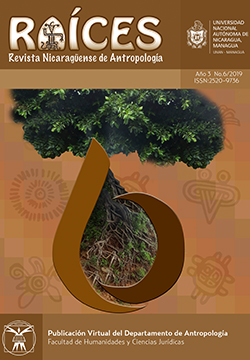Garífuna Matriarchate: Ancestrality, Spirituality and Struggle
DOI:
https://doi.org/10.5377/raices.v3i6.9009Keywords:
Keywords Garifuna, Matriarchy, Ancestrality, Spirituality, StruggleAbstract
The Garífuna people are an ancestral culture that has its origin in the union of three cultures; The African, Arawak and Caribbean. This new ethnic group has its own language, belief system, food and ancestral practices of agriculture, dances and songs that join their spirituality. They currently live in 48 Honduran communities, from Masca, department of Cortés, to Plaplaya, department of Gracias a Dios. They are also located in six urban centers in Belize, in two communities in Nicaragua and in one in Guatemala. It is estimated that there are about 250,000 Garifuna in Honduras and more than 100,000 who emigrated to the United States. The Garífuna culture is ancestral matrifocal, the old women are heirs of the ancestral spiritual knowledge that allow them to communicate with the ancestors and ancestors to those who offer offerings and ask for help in their struggles to conserve their territories that for them represent life, culture, the very existence of the Garifuna native people. Their struggle is as old as their origin, although they are great warriors who have known how to fight all the invaders, from the French and English who expelled them from San Vicente Island, to the State of Honduras that along the history has sought a way to expropriate the territories that were legitimately granted to them for more than two hundred years. In 2001 UNESCO declared the Garifuna culture Intangible Heritage of Humanity.
Downloads
References
Cacho, M. (sd de s/m de 2016). Origen garifuna. (M. Flores, Entrevistador) Davidson. (20 de enero de 1996). https://link.springer.com/article/10.1007/BF02862114. Obtenido de https://link.springer.com/article/10.1007/BF02862114: springer.com/article/10.1007/BF02862114
J, C. (29 de junio de 2019). Matrifocalidad. (M.Flores, Entrevistador)
Miranda, M. (20 de Junio de 2019). Titulaciones de territorios Garifunas. (M. Flores, Entrevistador)
MONTENEGRO, E. D. (s/d de s/m de 1985). https://www.unicef.org/honduras/tomo_2_atlas.pdf. Obtenido de https://www.unicef.org/honduras/tomo_2_atlas.pdf: unicef.org/honduras/tomo_2_atlas.pdf
OFRANEH. (01 de Septiembre de 2019). http://ofraneh.org/ofraneh/quienes_somos.html. Obtenido de http://ofraneh.org/ofraneh/quienes_somos.html: ofraneh.org/ofraneh/quienes_somos.html
García, K. (29 de junio de 2019). Espiritualidad Garifuna. (M. Flores, Entrevistador)
Gargallo, F. (s/d de s/m de 2000).
https://www.redalyc.org/pdf/267/26701405.pdf. Obtenido de https://www.redalyc.org/pdf/267/26701405. pdf: redalyc.org/pdf/267/26701405.pdf




